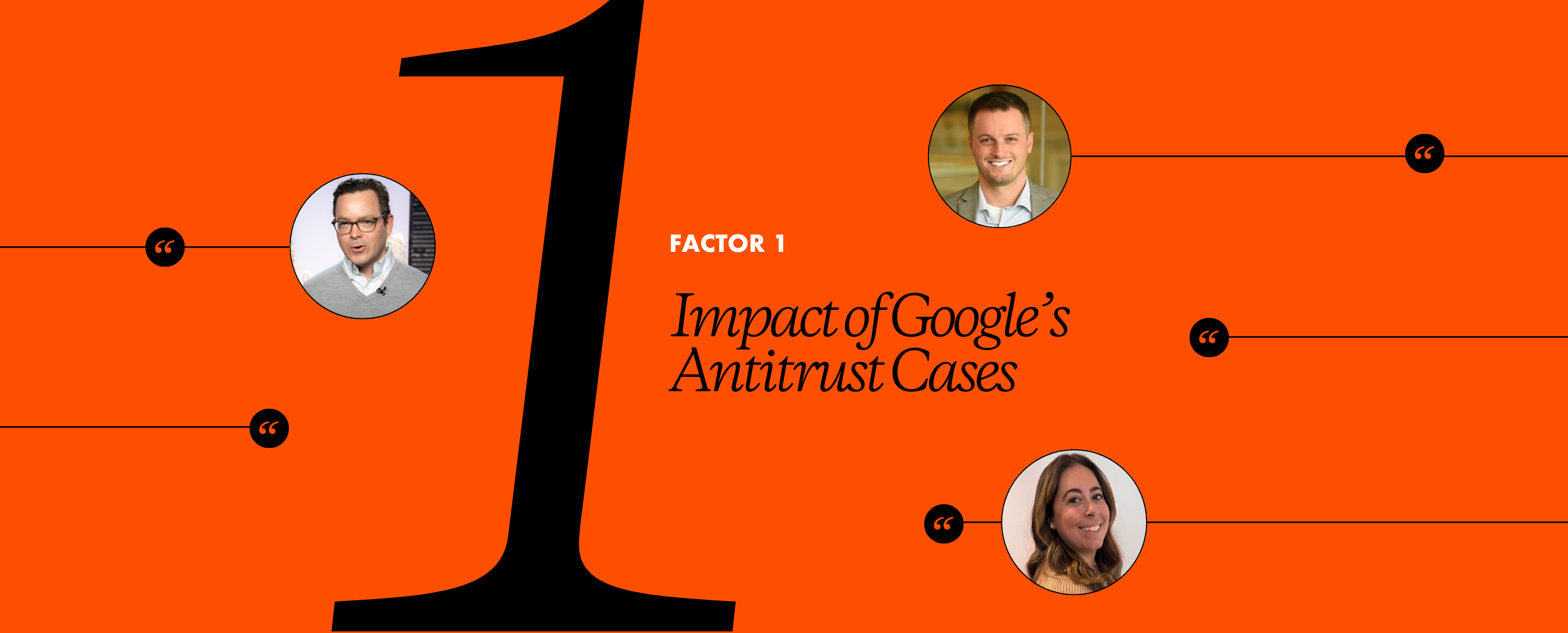To say the digital publishing industry is in flux is an understatement. Over the past year, publishers have faced a wave of challenges. We’ve seen revenue impacts from emerging technologies, watched Google’s on-again, off-again approach to cookie deprecation, observed shifts in consumer behavior that required quick adaptation, and much more.
To gain a deeper and more systematic understanding of how media companies and publishers are navigating these changes, we conducted focus group-style survey interviews with 31 industry leaders.
In this blog, we cover the first factor: Impact of Google’s Antitrust Cases.
Many publishers view the antitrust case against Google as a positive step to reducing Google’s control over search traffic and ad-tech tools, opening opportunities to regain market share and foster a more competitive landscape. Others are more skeptical that a guilty verdict will lead to meaningful change, while another cohort of participants, eyeing alternate behemoths in the industry, believe Google’s dominance may in fact be a “lesser evil.”
Of the 31 industry executives we asked about the potential impact of a “guilty” verdict on publishers:
| Positive | Neutral | Negative |
| 17 | 12 | 4 |
Opportunity: Increased Competition and Choice in Ad Tech
Many respondents believe that breaking up Google’s ad-tech business would allow for healthier competition, granting publishers access to a broader range of ad-tech providers and tools. This increased choice could lead to better deals, fairer ad auctions, and ultimately higher ad revenues for publishers.
“Any disruption of the largest competitor to open web publishers creates an opportunity for a redistribution of advertising spend.” — Gabriel DeWitt, Head of Monetization, Yahoo!
“I think there will be white space and publishers will be able to take advantage of these investments by the ad tech community.” — Matthew Goldstein, Consultant & Media Expert
“This will be positive for publishers because it will increase competition in the industry and will result in more buying across the open internet by new entrants, thus lifting all CPM’s for the publisher.” – Sid Sapru – Chief Operations Officer, OpenWeb
Opportunity: Transparency and Fairness in Ad Auctions
Many participants spoke about how Google’s dominance in ad-tech has led to opaque processes that many believe favor its own platforms. Among them, there is hope that the antitrust case could lead to increased transparency, fairer auctions, and higher yields for publishers.
“Increased competition is a positive: More Ad Tech Options. If Google’s ad-tech dominance is broken up, publishers could have access to a wider range of ad tech platforms.” — Sherrick Chavda, Group Director of Audience & Strategy, Initiative
“When publishers can yield optimize fairly, with no restrictions, that drives up prices, moving us to a more equitable marketplace.” — Jason C. White, Chief Product & Technology Officer, The Arena Group
Opportunity: Potential for Structural Changes Beneficial to Publishers
Some participants looked to a guilty verdict as a step toward structural changes that could unlock new revenue streams for publishers.
“The guilty verdicts open the way for class actions across the world… enough to refloat the global media industry.” — Ricky Sutton, Founder, Future Media
“I think the overall outcome will be positive for publishers, regardless of the verdict. The cases [address] some of the biggest challenges publishers face in today’s market.” — Matt Barsomian, Director of Digital Partnerships, Ad Ops, and Revenue Strategy, NESN
Mixed Outlook: Skepticism and Uncertainty About Meaningful Change
Conversely, some participants believe the lawsuit is unlikely to lead to substantial changes for publishers, as Google’s influence is too entrenched. Others thought the degree of impact would be difficult to predict without yet knowing the specific remedies to be recommended.
“Google’s public affairs team is so deeply entrenched in DC and they sprinkle around so much money that it is hard to imagine the DOJ will have congressional support for remedies that have any teeth in them.” — Anonymous
“The damage is already done. There’s probably no remedy significant enough to stem the collapse of traditional media.” — Jennie Baird, Chief Product Officer, BBC Studios
“It’s very hard to know what the impact on publishers will be until the remedies are clear. Some potential remedies could be great for publishers – while others could be quite harmful.” — Paul Bannister, Chief Strategy Officer, Raptive
“I think it depends on what the remedies are.” – Anonymous
Mixed Outlook: Don’t Plan Your Strategy Around One Factor
A few respondents pointed out that publishers should focus on adapting to industry changes rather than counting on a legal resolution. From these respondents, the rapid evolution of the media ecosystem and the immediate needs of publishers are highly pressing, competitive concerns.
“Too early to say. For one, it’s too early to say that Google will be broken up… Additionally, as a publisher, the ecosystem is evolving so quickly that while we need to be thinking long term, it’s imperative that we also focus on the 1-3 year growth more aggressively.” — Anonymous
“Publishers should anticipate these trends continuing for the foreseeable future, and accelerating thanks to AI… By the time the suit is resolved, how many publishers will be around to feel the impact?” — Jeremy Kaplan, Content Director, Future PLC
Potential Downsides: Doubt Over Meaningful Change and Potential Lower Payouts
Some participants pointed out that even if Google’s ad-tech arms are separated, the buy-side and sell-side relationship could stay the same. With two entities now needing to profit, publishers could see reduced ad revenues as both aim to maintain margins.
“On the search side, many users will still type ‘google,’ making the default search setting less relevant. On the ad-tech side, even if Google’s buy-side and sell-side are separated, their relationship may remain strong. Any shift in spending from Adwords to other SSPs would depend on performance, as companies aren’t required to buy from lower-performing partners. Additionally, splitting Google into two entities could reduce payouts to publishers, as both would seek to maintain profitability.” — Andrew Kraft, On a Listening Tour, Former President & Chief Operating Officer at The Arena Group.
Potential Downsides: Unforeseen Disadvantages
Interestingly, one participant thought that breaking up Google could lead to unforeseen disadvantages, as other major ad-tech players like The Trade Desk or Amazon may not be any friendlier to publishers.
“Whether or not you like Google, they have been much friendlier to publishers… Other major players in the industry, such as The Trade Desk and Amazon. position themselves as ‘friends of publishers,’ but they are very much not friends to publishers.” — Anonymous
You can download the full 5 Factors for 2025 report on our website.


